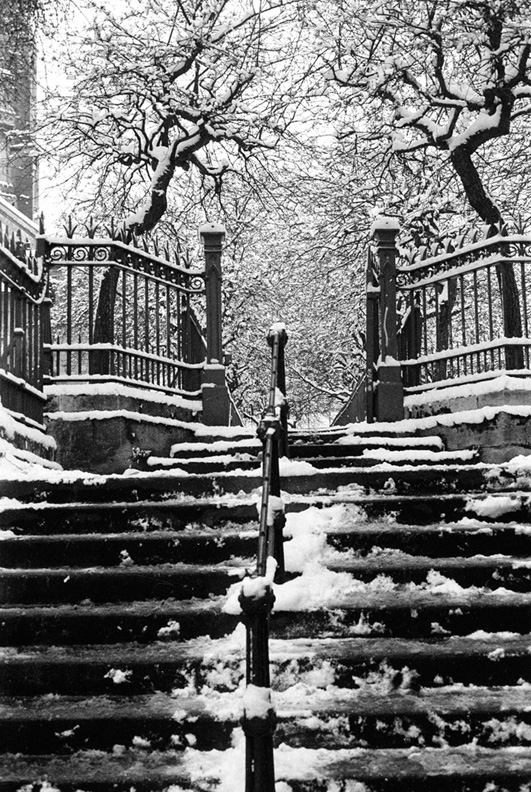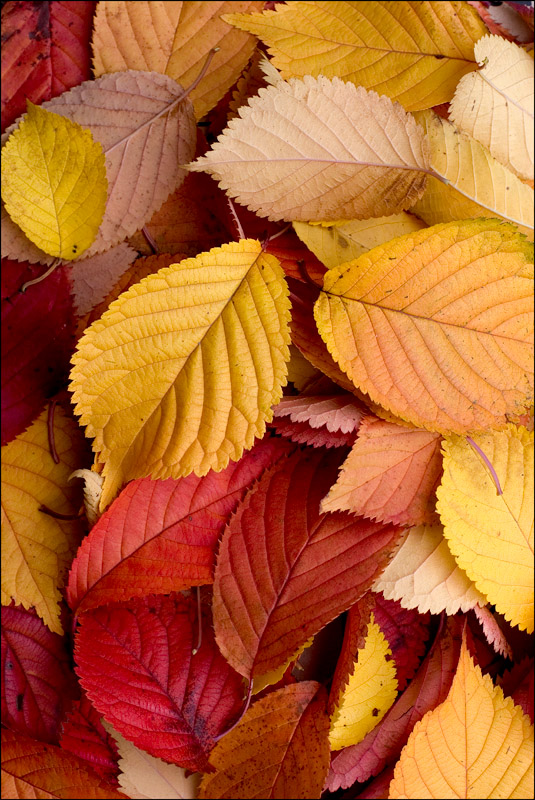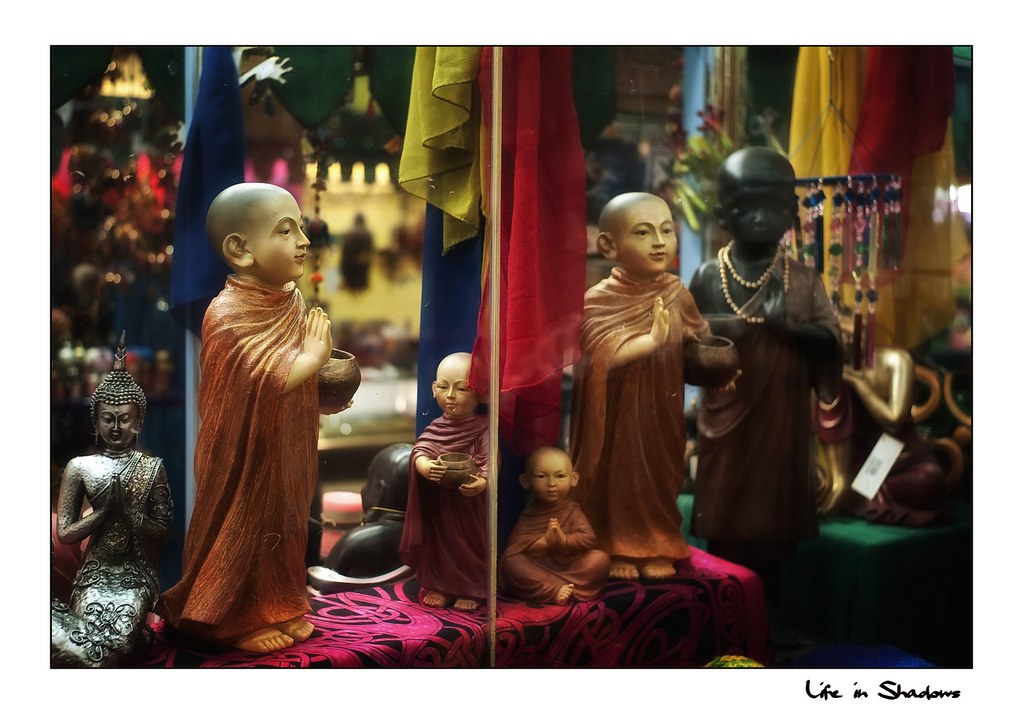pftact
-
The terms black and white and color made sense when there was black and white and color films. With digital color is the normal output. World is also in color. Digital b&w is very easy and therefore like everything that is easy, its no good. B&W film also looks cliched because the very b&w look has become a tired cliched that tries to relive the past glory of B&W photography in a different age. Normal or color with digital is the singular photography medium today.
Im a reductive photographer (ie I identify a wide scene and then subtract elements until I'm satisfied) and I think color adds something.
When I look at my color work that I think is ok, I clearly took something else out to make room for the color. Also, looking for scenes with balanced colors is hard because it's much rarer than scenes with balanced values, IMO. More colors = more combinations = less chance to find something you like.
When I look at my color work that I think is ok, I clearly took something else out to make room for the color. Also, looking for scenes with balanced colors is hard because it's much rarer than scenes with balanced values, IMO. More colors = more combinations = less chance to find something you like.
Ranchu
-
It looks to me like your lens has a green cast, like most. Your D800 has too much contrast for the scene, too much contrast=too much saturation=color casts are much harder to eradicate, with digital some are impossible. Like when the fence is blown. For good color, sell the digital before it falls in value too much, get a scanner, and clear not green or red lenses. They will tend to be softer, in general. Or use digital, but use flash on everything as above. Or use digital and only shoot low contrast scenes. I didn't see the point of any of that, but I'm not trying to get paid.
Gabriel M.A.
My Red Dot Glows For You
I think it boils down to personal taste and sensitivities. Quickly perusing through your flickr stream I can see you are more drawn into forms and light/shadow play and "color" may really break that for you visually, in the sense that playing a tune on a piano would be obviously a tune, but when somebody comes up and plays a key in there that doesn't belong in the tune doesn't mean that the piano is broken, but merely that you were not ready for that note. But that's an admittedly bad analogy, but I'm simply trying to illustrate what I think is your dissatisfaction with your own color shots.
I think that the suggestion above about shooting nothing but color for a while may help you "tune" your visual mind.
Color is far more difficult to master for you (general "you" not you you) if you want it to be in harmony with the compositional vision you acquired in B&W. You'll notice that many photographers who don't do B&W do not have a compositional sensibility and find B&W pointless. There are also B&W photographers who find color pointless. Whenever you get stuck in one thing you find everything else either pointless, "a fad" or "horrible". You posing this question for yourself and asking around is a great sign you're not one of those.
I think that the suggestion above about shooting nothing but color for a while may help you "tune" your visual mind.
Color is far more difficult to master for you (general "you" not you you) if you want it to be in harmony with the compositional vision you acquired in B&W. You'll notice that many photographers who don't do B&W do not have a compositional sensibility and find B&W pointless. There are also B&W photographers who find color pointless. Whenever you get stuck in one thing you find everything else either pointless, "a fad" or "horrible". You posing this question for yourself and asking around is a great sign you're not one of those.
Photo_Smith
Well-known
I would like to echo the post above about Art and displaying on monitors and add the following:
Colour or mono is a personal thing, colour is a physiological experience, one that is not always needed, for form and shadow sometimes a lack of colour really helps, my personal take is that if colour doesn't enhance the subject then mono may be better.
Would colour help me here?

With your Autumn leaves shot I found it unpleasantly green and over saturated, the green may have come from the light through the leaves, but with subjects the eye expects to have warmth green and cyan work against that, even if it reflects the scene as you saw it.
It's easy to overstep the mark with colour but if you're going too make it in a direction the observer expects:

Good luck!
Colour or mono is a personal thing, colour is a physiological experience, one that is not always needed, for form and shadow sometimes a lack of colour really helps, my personal take is that if colour doesn't enhance the subject then mono may be better.
Would colour help me here?

With your Autumn leaves shot I found it unpleasantly green and over saturated, the green may have come from the light through the leaves, but with subjects the eye expects to have warmth green and cyan work against that, even if it reflects the scene as you saw it.
It's easy to overstep the mark with colour but if you're going too make it in a direction the observer expects:

Good luck!
retnull
Well-known
There's color, and then there's COLOR. The best colors are YOUR colors.
By that I mean, there are color photos that are "accurate" or at least try to be accurate. The idea is that the viewer shouldn't have to think about the colors: the image is just a realistic capture.
Then there's the expressive use of color. Why not admit your image is an image (not reality), and that color tonalities are just as much a choice as the way you frame your compositions or choose an amount of depth of field.
After thinking about it for years, I realized I like b+w, but very occasionally I like to make color images that have slightly low saturation and a slight red-blue cast. That's just what makes me feel good.
By that I mean, there are color photos that are "accurate" or at least try to be accurate. The idea is that the viewer shouldn't have to think about the colors: the image is just a realistic capture.
Then there's the expressive use of color. Why not admit your image is an image (not reality), and that color tonalities are just as much a choice as the way you frame your compositions or choose an amount of depth of field.
After thinking about it for years, I realized I like b+w, but very occasionally I like to make color images that have slightly low saturation and a slight red-blue cast. That's just what makes me feel good.
Ranchu
-
I should mention, clear color lenses for nikon include the 50mm/2 AI which will fit your d800, and also the 35mm f2 AF as I understand, I haven't tried it.
peterm1
Mentor
When I shoot color I will often try to reduce it to its bare elements. Does it work? Who knows, I like it so I do it, I guess its up to others to figure out if they do too. Some may hate it but thats life. To my mind its all about exerimenting to find a style you like for the specific image in question. I find that when I make images where the color is absolutely accurate to the real world, they tend to be a bit boring. Instead I often try to use the color for an artitistic effect, either by leaving it in but downplaying it or (less often) by emphasising it.
Here the real subject is the pattern of lines from the architectural elements. Its almost a monochrome as the only colour is a bit of pale aqua.This way the color acts as a counterpoint but does not compete with the main elements.

Abstract mechanical by yoyomaoz, on Flickr
Here I have turned the colors down too. I wanted them present as I thought the image would lack something in mono but I did not want the image to be "about" the color".

Buddah prays by yoyomaoz, on Flickr
Here too. There is plenty of color but its softened by the use of tone and vignette to focus attention on the mian subject - the young woman in the centre who looks very contemplative but is probably just studying the menu to decide if she wants Earl Grey or English Breakfast.

Through a glass darkly 6 by yoyomaoz, on Flickr
In this following shot which was taken in the same location as Buddah it is about the color. But even here I turned down the saturation a smidge as I though a real representation of the image I saw in life would be a bit too in your face. It gives a kind of mellowness that I like.

A little piece of Asia in Adelaide by yoyomaoz, on Flickr
Here the real subject is the pattern of lines from the architectural elements. Its almost a monochrome as the only colour is a bit of pale aqua.This way the color acts as a counterpoint but does not compete with the main elements.

Abstract mechanical by yoyomaoz, on Flickr
Here I have turned the colors down too. I wanted them present as I thought the image would lack something in mono but I did not want the image to be "about" the color".

Buddah prays by yoyomaoz, on Flickr
Here too. There is plenty of color but its softened by the use of tone and vignette to focus attention on the mian subject - the young woman in the centre who looks very contemplative but is probably just studying the menu to decide if she wants Earl Grey or English Breakfast.

Through a glass darkly 6 by yoyomaoz, on Flickr
In this following shot which was taken in the same location as Buddah it is about the color. But even here I turned down the saturation a smidge as I though a real representation of the image I saw in life would be a bit too in your face. It gives a kind of mellowness that I like.

A little piece of Asia in Adelaide by yoyomaoz, on Flickr
David Hughes
David Hughes
Hi,
I don't know why you are worrying. Especially about colour vs B&W.
One or two of your photo's I would have taken a little differently but that's me and not a question of good or bad; just a question of preferences. (I'm thinking more of composition than colour, btw.)
A couple of thoughts; have you had your eyes tested? You could be mildly colour blind and it may affect how you see the pictures. Not that it matters very much as we all see them differently.
Secondly, are you shooting in raw? My experience of it is that it gives you/me/everyone a million or more ways of getting confused and messing up the photo. It might be worthwhile to abandon it for a day and set all the menus to the mid point and produce jpgs. This then providing a yardstick to work with or on. Or use slide film in a film camera .
Lastly, do you experiment with the exposure? it often affects the colours you get.
Regards, David
PS I'm resisting the temptation to point out that what you do get wrong with colour is spelling the word... ;-)
I don't know why you are worrying. Especially about colour vs B&W.
One or two of your photo's I would have taken a little differently but that's me and not a question of good or bad; just a question of preferences. (I'm thinking more of composition than colour, btw.)
A couple of thoughts; have you had your eyes tested? You could be mildly colour blind and it may affect how you see the pictures. Not that it matters very much as we all see them differently.
Secondly, are you shooting in raw? My experience of it is that it gives you/me/everyone a million or more ways of getting confused and messing up the photo. It might be worthwhile to abandon it for a day and set all the menus to the mid point and produce jpgs. This then providing a yardstick to work with or on. Or use slide film in a film camera .
Lastly, do you experiment with the exposure? it often affects the colours you get.
Regards, David
PS I'm resisting the temptation to point out that what you do get wrong with colour is spelling the word... ;-)
cz23
-
Seraj,
If your concern is color post-processing, one thing you might try is buying a copy of Snapseed for your computer and experimenting with the different presets. I'm not suggesting you use them for regular post work, but it's a great cheap way to explore alternate methods of color processing. Lots of options with subtle to intense variations.
My other suggestion is to start looking at more color work. Library books or whatever. Like everyone said above, it's a new genre for you and that requires study, work, and finding your own color voice.
I should say that after decades of shooting b&w exclusively, I've recently started with color. One thing I know; out of camera color is too realistic and is missing the expressive element I enjoy. The above are my two current paths for finding my way.
John
If your concern is color post-processing, one thing you might try is buying a copy of Snapseed for your computer and experimenting with the different presets. I'm not suggesting you use them for regular post work, but it's a great cheap way to explore alternate methods of color processing. Lots of options with subtle to intense variations.
My other suggestion is to start looking at more color work. Library books or whatever. Like everyone said above, it's a new genre for you and that requires study, work, and finding your own color voice.
I should say that after decades of shooting b&w exclusively, I've recently started with color. One thing I know; out of camera color is too realistic and is missing the expressive element I enjoy. The above are my two current paths for finding my way.
John
jtm6
Well-known
As others have mentioned, study color theory not just color photography. Your sense of color is probably better than most (since you are visually creative, interested in being visually creative, and notice something is off but not sure what it is). As you develop an understanding, you will see the reasons why it might or might not work in a given situation. You may also decide, "ok, I understand it now but I want to shoot black and white even more." 
Share:
-
This site uses cookies to help personalise content, tailor your experience and to keep you logged in if you register.
By continuing to use this site, you are consenting to our use of cookies.

